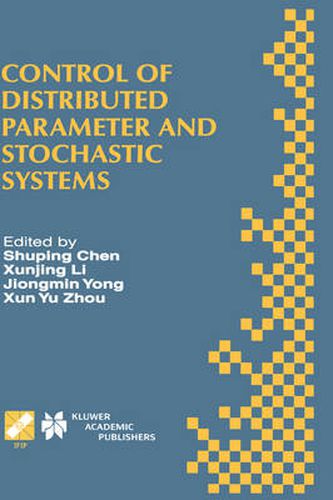Readings Newsletter
Become a Readings Member to make your shopping experience even easier.
Sign in or sign up for free!
You’re not far away from qualifying for FREE standard shipping within Australia
You’ve qualified for FREE standard shipping within Australia
The cart is loading…






This title is printed to order. This book may have been self-published. If so, we cannot guarantee the quality of the content. In the main most books will have gone through the editing process however some may not. We therefore suggest that you be aware of this before ordering this book. If in doubt check either the author or publisher’s details as we are unable to accept any returns unless they are faulty. Please contact us if you have any questions.
In the mathematical treatment of many problems which arise in physics, economics, engineering, management, etc., the researcher frequently faces two major difficulties: infinite dimensionality and randomness of the evolution process. Infinite dimensionality occurs when the evolution in time of a process is accompanied by a space-like dependence; for example, spatial distribution of the temperature for a heat-conductor, spatial dependence of the time-varying displacement of a membrane subject to external forces, etc. Randomness is intrinsic to the mathematical formulation of many phenomena, such as fluctuation in the stock market, or noise in communication networks. Control theory of distributed parameter systems and stochastic systems focuses on physical phenomena which are governed by partial differential equations, delay-differential equations, integral differential equations, etc., and stochastic differential equations of various types. This has been a fertile field of research with over 40 years of history, which continues to be very active under the thrust of new emerging applications. Among the subjects covered are: - Control of distributed parameter systems; - Stochastic control; - Applications in finance/insurance/manufacturing; - Adapted control; - Numerical approximation. It is essential reading for applied mathematicians, control theorists, economic/financial analysts and engineers.
$9.00 standard shipping within Australia
FREE standard shipping within Australia for orders over $100.00
Express & International shipping calculated at checkout
This title is printed to order. This book may have been self-published. If so, we cannot guarantee the quality of the content. In the main most books will have gone through the editing process however some may not. We therefore suggest that you be aware of this before ordering this book. If in doubt check either the author or publisher’s details as we are unable to accept any returns unless they are faulty. Please contact us if you have any questions.
In the mathematical treatment of many problems which arise in physics, economics, engineering, management, etc., the researcher frequently faces two major difficulties: infinite dimensionality and randomness of the evolution process. Infinite dimensionality occurs when the evolution in time of a process is accompanied by a space-like dependence; for example, spatial distribution of the temperature for a heat-conductor, spatial dependence of the time-varying displacement of a membrane subject to external forces, etc. Randomness is intrinsic to the mathematical formulation of many phenomena, such as fluctuation in the stock market, or noise in communication networks. Control theory of distributed parameter systems and stochastic systems focuses on physical phenomena which are governed by partial differential equations, delay-differential equations, integral differential equations, etc., and stochastic differential equations of various types. This has been a fertile field of research with over 40 years of history, which continues to be very active under the thrust of new emerging applications. Among the subjects covered are: - Control of distributed parameter systems; - Stochastic control; - Applications in finance/insurance/manufacturing; - Adapted control; - Numerical approximation. It is essential reading for applied mathematicians, control theorists, economic/financial analysts and engineers.